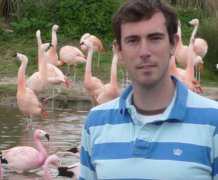
Paul Rose aims to use feathers from the flamingos for DNA testing to unravel the mysteries surrounding their relationships.
Paul hopes to solve the mysteries of flamingo fatherhood
A researcher at the University of Exeter has launched a bid to analyse the DNA of a group of flamingos in order to answer some of the questions surrounding paternity and social behaviour in the distinctive pink birds.
Paul Rose, a PhD student in the Centre for Research in Animal Behaviour, has been working with flamingos for three years at Slimbridge Wetlands Centre in Gloucestershire and is now embarking on a crowdfunding bid to genetically analyse who is related to who within the flock.
He said: “Flamingos are amazing birds. They have been around for millions of years and occur in incredibly hostile habitats where they live in flocks of up to a million or more. These huge flocks could be the foundation for special and important relationships between individual birds. As flamingos can live into their eighties, relationships that do exist between birds could be as important as the friendships that we form as humans. We know that our quality of life is enhanced by our relationships and friends – for a bird as long-lived as the flamingo, this could also be the case.”
Paul’s research uses social network analysis to evaluate the importance of stable relationships that contribute to the longevity, reproductive success and good welfare for individual animals in managed groups.
He added: “I have behavioural data which shows which birds have friendships, but I’d really like to see if I can support this with data which shows if they are genetically linked. It would be fascinating to learn whether unrelated individuals form proper friendships – if family groups are sticking together or are sorting themselves simply on the fact that they are attached to another animal.”
The flamingos at the heart of his study have this year featured on David Attenborough’s Natural Curiosities, and on Liz Bonin’s BBC One series, Animals in Love, where he explained the courtship displays and behaviour of flamingos.
He is hoping to raise the necessary funds to carry out the genetic work, present his findings at a major conference in the subject and give some money to the Wildfowl and Wetlands Trust for their ongoing support for his work.
For more information or to pledge funds towards Paul’s project visit: https://hubbub.net/p/friendlyflamingos
To learn about the University of Exeter’s MSc Animal Behaviour visit our Postgraduate Study website.
Date: 17 March 2015
